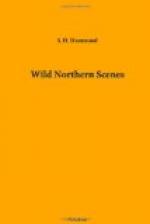CHAPTER XXVIII.
HEADED DOWN STREAM—RETURN TO TUPPER’S LAKE—THE CAMP ON THE ISLAND.
We started down stream again at six o’clock in the morning, intending, if possible, to reach Tupper’s Lake before encamping for the night. It would make for us a busy day to accomplish so much; but going down stream and down hill are very different things from going up, as any gentleman may satisfy himself by rowing against a current of two miles the hour, or toiling up an ascent of three or four hundred feet to the mile, and then retracing his steps. We accomplished more than half the distance, and that over the worst of the journey, by twelve o’clock, and we halted for dinner and a siesta. If there is one thing in life which can lay any claim to being considered a positive luxury, it is a nap on a mossy bank, in the deep shadows of the forest trees, after a hearty meal, of a warm summer day. There should be, in order to its full appreciation, a mixture of weariness with a due proportion of laziness. Too much of either detracts from the enjoyment of its beatitudes. To feel the sensation of resting, that weariness is leaving you, and that the process of recuperation is an active, living agency, going on all through the system, while the natural love of repose is being gratified as an independent emotion, constitute the very perfection of mere animal enjoyment. The musquitoes at midday have gone to their rest, or if a straggler comes buzzing and singing about your ears, you are lulled rather than disturbed by his song. If he takes his drop of blood from your veins, the tickling of his tiny lance is but a pleasant titilation, and you let him feed on, almost grateful for his kindness in keeping you from sleeping too soundly, or losing in utter oblivion the full extent of the luxury of perfect repose.
After an hour’s rest, we launched our little fleet upon the river again, and while the sun was yet above the western highlands, we stood upon the broad flat rock at the mouth of Bog River, looking out over Tupper’s Lake, one of the most beautiful sheets of water that the sun or the stars ever looked upon. Our sea-biscuit was getting low, and our egress from the wilderness was therefore becoming, in some sort, a necessity. There was no lack of venison, or fish, but these are rather luxuries than actual necessaries, and they were becoming somewhat stale to as. The staff of life is bread, and of this we had but two days’ supply. It is entirely true that our jerked venison, now dry and hard as chips, could, if necessary, be made to furnish, to some extent, a substitute; still, while “it is written that man shall not live by bread alone,” it is equally the law that he cannot very well get along without it.




